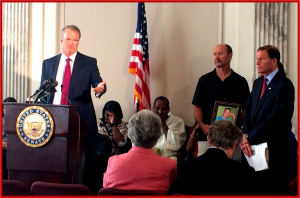
GM is in a tight spot here in a class action strategy that is clearly designed to discredit its defense of senior executive actions. The cornerstone of that strategy is discrediting the Valukas report.
In an all too predictable attorney attack, Bob Hilliard, lead counsel for the class-action plaintiffs in litigation against General Motors for selling unsafe ignition switches, is charging that GM’s actions are “simply mind-blowing in its raw evilness.”
Hilliard – in a release first leaked to major news organizations and designed to create a sensation – said GM ordered 500,000 replacement ignition switches on December 18, 2013 for what it called “an urgent field action.” In other words long before it actually recalled the cars, which by the way was once a common industry practice.
The charges come from internal Delphi e-mails produced during the discovery process of ignition lawsuits against GM. At least 32 deaths – so far – have been attributed to a defective Delphi-produced switch that has a troubled history going back to its initial GM design stages at the turn of the last century. GM remains under investigation by the NHTSA, the Securities and Exchange Commission, the Canadian Safety Agency, virtually all of the Attorney Generals in the U.S., and faces hundreds of lawsuits over the debacle.
The problems thereby arising for GM are a compound of ethical, legal and image issues. GM did not tell NHTSA that it was initiating the recall it had pre-ordered millions of dollars of parts for until 57 days later. Worse in the view of a growing body of critics, GM did not begin telling its own customers who were at risk for 117 days after the parts order.
The newly revealed Delphi/GM ignition switch e-mails also call into question the validity of the so-called Valukas Report – thus far the official GM internal investigation of what is now unquestionably the largest safety crisis in GM’s history. Part of this plaintiff litigation strategy – and billions are at stake here – is casting doubt on the Congressional testimony of GM CEO Mary Barra where she maintained under oath that only a few low-level GM people knew of the deadly ignition switch problem, which is the finding of the GM-financed Valukas tome.
Moreover, Barra claimed she did not learn of the initial Chevrolet Cobalt ignition switch recall until January of this year. In February, GM recalled 700,000 cars, later expanded to 2.6 million vehicles for the defective ignition switches that suddenly shutdown, thereby disabling a car’s safety systems. More safety problems would soon be revealed as GM has now recalled 26 million U.S. vehicles – so far – this year for a variety of potentially dangerous defects.
In a statement GM said, “These emails are further confirmation that our system needed reform, and we have done so. We have reorganized our entire safety investigation and decision process and have more investigators, move issues more quickly and make decisions with better data.”
GM is in a tight spot here up against a legal strategy that is clearly designed to discredit its defense of senior executive actions. The cornerstone of that strategy is discarding the Valukas report.
“How could Mr. Valukas, in his 315 page report miss this? (The earlier Delphi e-mails). GM either kept this critical piece of evidence hidden from Mr. Valukas, or he purposefully left it out. Either way—the entire report and its conclusions are now suspect,” claims Hilliard, who stands to make millions if the class action is successful.
“Sworn to tell the truth, how did Mary Barra forget to tell Congress that, while she was the GM Executive Vice President, global product development, purchasing and supply chain, and 9 days before she became CEO of GM, GM purchased $3 million dollars of ignition switch supplies to replace the defective ones—a cost that was not budgeted?” said Hilliard.

